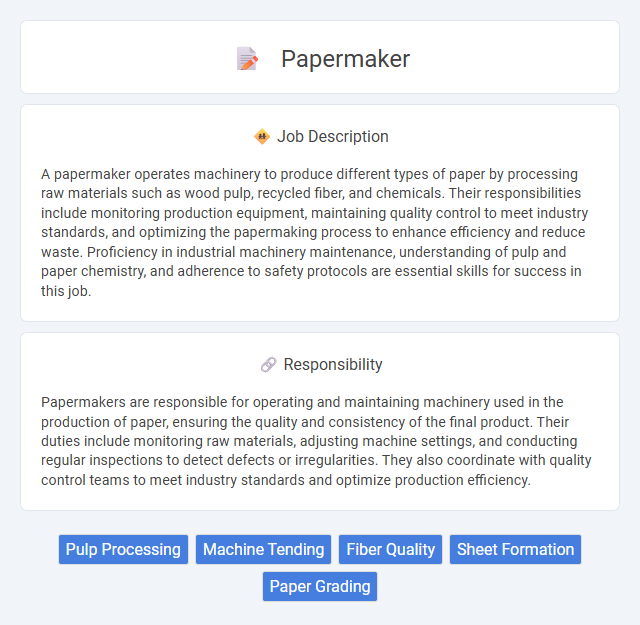
A papermaker operates machinery to produce different types of paper by processing raw materials such as wood pulp, recycled fiber, and chemicals. Their responsibilities include monitoring production equipment, maintaining quality control to meet industry standards, and optimizing the papermaking process to enhance efficiency and reduce waste. Proficiency in industrial machinery maintenance, understanding of pulp and paper chemistry, and adherence to safety protocols are essential skills for success in this job.
Papermaking is likely suitable for individuals who can tolerate physically demanding environments and have good attention to detail, as the job often requires standing for long periods and working with heavy machinery. Those with a preference for repetitive tasks and a tolerance for noise and humidity may find this occupation more fitting. People with respiratory issues or difficulties in handling physically strenuous work might not be well-suited for the conditions of a Papermaker job.
Qualification
A papermaker must possess a high school diploma or equivalent, with specialized training in paper manufacturing or industrial production preferred. Proficiency in operating and maintaining machinery, understanding chemical processes, and adhering to safety protocols is essential. Strong attention to detail, mechanical aptitude, and physical stamina are critical qualifications for successful performance in the papermaking industry.
Responsibility
Papermakers are responsible for operating and maintaining machinery used in the production of paper, ensuring the quality and consistency of the final product. Their duties include monitoring raw materials, adjusting machine settings, and conducting regular inspections to detect defects or irregularities. They also coordinate with quality control teams to meet industry standards and optimize production efficiency.
Benefit
Working as a papermaker likely offers benefits such as competitive wages and opportunities for skill development in industrial manufacturing. Employees may experience a stable work environment with health and safety measures in place, supporting overall well-being. Job benefits probably include access to health insurance, retirement plans, and potential shift differentials, enhancing financial security.
Challenge
The papermaker job likely involves complex challenges such as maintaining consistent paper quality and managing production efficiency under fluctuating raw material conditions. Workers probably face difficulties in troubleshooting machine malfunctions and adapting to technological advancements in papermaking processes. Handling environmental regulations and ensuring sustainable practices might also present ongoing challenges in this role.
Career Advancement
Papermakers can advance their careers by gaining expertise in process optimization and quality control within the manufacturing sector. Mastery of modern papermaking machinery and knowledge of sustainable production techniques often lead to supervisory or management roles. Continuous training and certifications in industrial engineering or production management significantly enhance promotion prospects and earning potential.
Key Terms
Pulp Processing
Papermakers specializing in pulp processing play a crucial role in converting raw wood materials into high-quality pulp used for paper production. Their expertise includes managing chemical treatments and mechanical refining to ensure optimal fiber consistency, brightness, and strength. Proficiency in operating and maintaining digesters, washers, and bleaching equipment directly impacts the efficiency and sustainability of the pulp manufacturing process.
Machine Tending
Papermakers specializing in machine tending operate and monitor automated paper production equipment to ensure continuous and efficient operation. They perform routine maintenance, troubleshoot mechanical issues, and adjust machine settings to maintain product quality and reduce downtime. Expertise in controlling paper machines and understanding the nuances of paper stock feed and tension is critical for optimizing machine performance.
Fiber Quality
Papermakers play a crucial role in ensuring fiber quality by selecting and processing raw materials that affect the strength, texture, and durability of paper products. Monitoring fiber length, cleanliness, and consistency during pulping and refining enhances the final product's performance and reduces defects. Advanced papermaking techniques and quality control measures optimize fiber properties to meet specific industry standards and customer requirements.
Sheet Formation
Papermakers specializing in sheet formation control the distribution and bonding of pulp fibers to create uniform paper sheets with desired thickness and strength. They monitor parameters such as fiber consistency, slurry flow rate, and drainage efficiency to ensure optimal sheet quality. Precise regulation of the forming section on wire mesh belts enhances sheet smoothness and reduces defects, directly impacting the final paper product's performance.
Paper Grading
Papermakers specializing in paper grading assess the quality, texture, weight, and durability of various paper products to ensure compliance with industry standards. They utilize precise measurement tools and visual inspection techniques to categorize paper types, aiding manufacturers in maintaining consistent product output. Accurate paper grading directly impacts product usability across sectors such as packaging, printing, and publishing.
 kuljobs.com
kuljobs.com